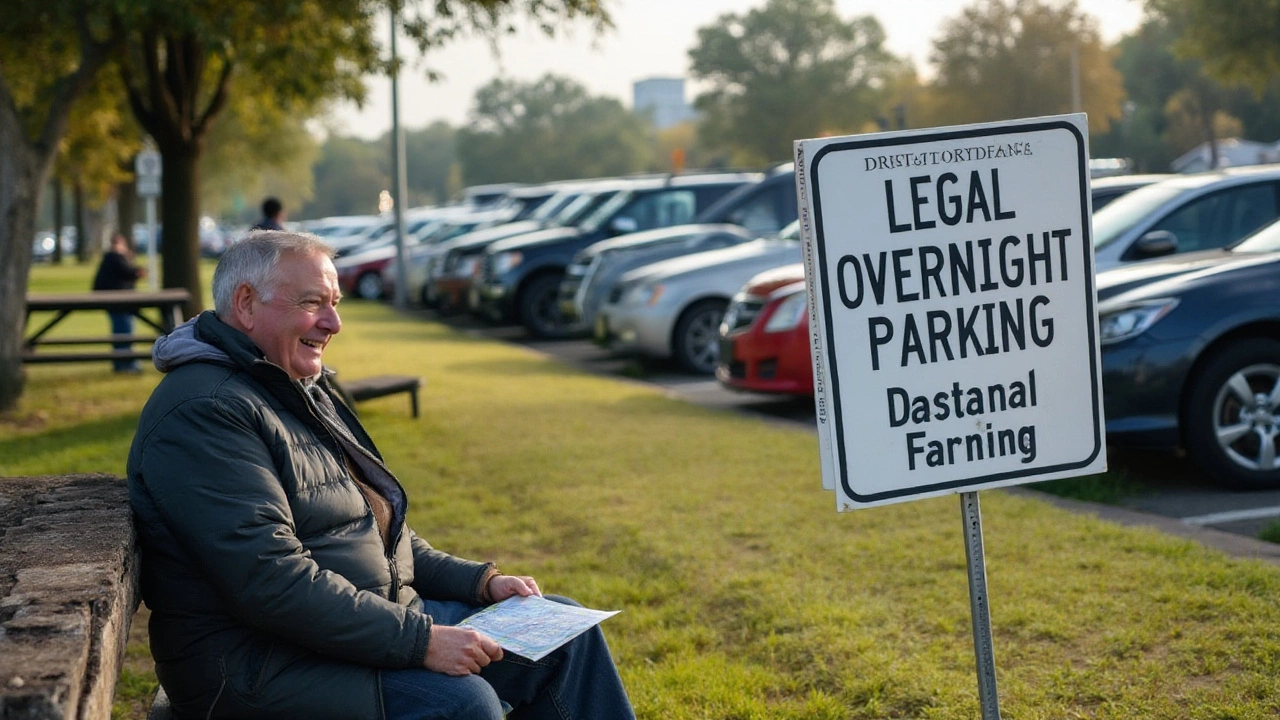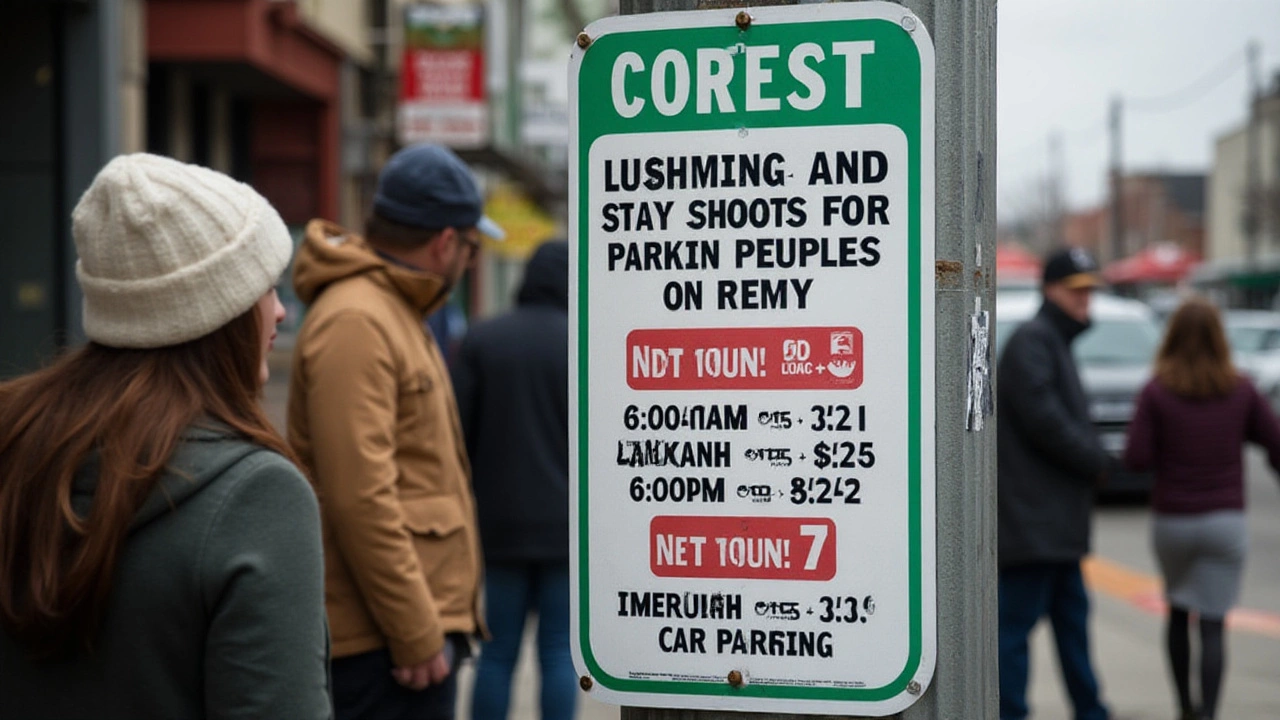Where to Legally Sleep in Your Car in Houston: A Guide for Those in Need
 Jan, 19 2025
Jan, 19 2025
For many, the car is more than just a means of transportation; it's a temporary refuge during tough times. In Houston, where navigating the nuances of the law is crucial, knowing where you can legally park and sleep can be life-changing. As housing insecurity grows, understanding your options becomes essential.
This guide offers an informative path through Houston's parking regulations, safe locations, and available support. Empower yourself with the knowledge to ensure you sleep safely and within the confines of the law as you work towards more stable housing solutions.
- Understanding Local Laws
- Safe Parking Programs
- Public Spaces and Amenities
- Private Properties and Permissions
- Utilizing Homeless Shelters
- Community Support and Resources
Understanding Local Laws
Understanding the local laws and regulations surrounding car sleeping in Houston is crucial for those who often find themselves without a permanent home. In Houston, and indeed across much of the United States, the laws can be somewhat of a minefield, often varying from neighborhood to neighborhood and street to street. To ensure you remain compliant with city ordinances, it's important to first know that Houston does not outright ban sleeping in your car, but it does come with conditions focused on location and safety. Staying in residential streets overnight can sometimes draw unwanted attention or complaints from residents, which can result in law enforcement interactions.
Being aware of local ordinances is paramount. Parking overnight in public spaces, like libraries or parks, is generally frowned upon, and most of these locations have specific hours when parking is allowed. The idea is not to restrict or punish those in difficult circumstances but to maintain public order and safety. Often, signs are posted to indicate restricted hours, and it's imperative to observe them to avoid fines or potential towing. According to a recent Houston City Council meeting, there has been some effort to create more inclusive policies that account for the challenges faced by those without stable residences. City officials have started pushing for considerate measures, rather than strictly punitive ones.
A key part of navigating these rules successfully is knowing where you can park without risking hefty fines or conflict. Legally, parking on private property with permission from the owner — such as commercial parking lots overnight — can be a relatively safe bet. Some businesses are sympathetic and allow their lots to be used after closing hours. However, it's vital to seek permission first as trespassing laws are enforced rigorously. A police spokesperson once explained in a community meeting, 'We aim for cooperation, not confrontation. When people communicate with lot owners beforehand, it reduces misunderstandings.'
It's also worth exploring Safe Parking Programs, an initiative gaining traction in many urban areas, including Houston. These programs come with supportive services, helping those living in their cars find some semblance of routine and access to resources. The beauty of these programs lies in their capacity to offer a safe, non-judgmental environment. For many, this stability can be a launching pad towards improving their situation and finding more permanent housing solutions. Recognizing these programs helps break down the stigma and builds a stronger sense of community among those who might otherwise feel isolated and ignored.
Some statistics suggest that close to 40% of individuals experiencing homelessness in Houston rely on their vehicles for shelter — a stark reminder of the need for thoughtful policy. A 2023 survey conducted by the Coalition for the Homeless emphasized that individuals and families are more hopeful when given access to secure parking areas. This assessment pinpoints the need for continued cooperation between the city and private entities to broaden the scope of allowed locations for car sleepers. By staying informed and understanding these local laws, individuals can navigate their temporary living situations with more confidence and less stress, potentially paving the way for greater change and advocacy within the community.
Safe Parking Programs
Safe Parking Programs have become essential for countless individuals who find themselves needing to sleep in their vehicles in urban environments like Houston. These programs strive to provide a sense of safety and community for those who temporarily lack permanent housing. As housing insecurity continues to rise, more people are turning to their vehicles as a refuge. The idea behind safe parking is straightforward—to offer a secure and legal place where individuals can park overnight without fear of violations or disturbances.
In Houston, several initiatives have been established to address this need, often through collaborations between nonprofit organizations and local government agencies. These programs typically require participants to register in advance, allowing them to access designated parking lots patrolled by security. Participants are often encouraged to maintain the cleanliness of their area and adhere to guidelines that promote a harmonious environment. This can include restrictions on noise levels and requirements to leave the area by a certain time during the morning.
"Programs like these are vital," says a representative from a local nonprofit organization. "They don't just offer a parking space. They provide a measure of dignity and hope during difficult times."
Importantly, safe parking sites often aim to do more than just provide a place to park. Many programs offer additional services, such as connections to social services, access to sanitation facilities, or even mobile health services. This holistic approach recognizes that sleeping in a vehicle is rarely a long-term solution and seeks to connect participants with pathways to sustainable housing and employment opportunities. The impact of integrating comprehensive services ensures that those in need are not just surviving, but finding support systems that can offer long-term benefits.
The effectiveness of safe parking initiatives in Houston reflects a broader trend in urban areas across the United States. The collaborative efforts of civic leaders, community members, and nonprofits strive to humanize the face of homelessness. By offering structured environments where individuals can find nightly refuge, these programs mitigate some risks associated with sleeping in unauthorized or isolated areas. Plus, they help align community standards with compassion, offering people in need both security and paths toward rebuilding their lives.
While navigating the legalities of where to sleep in car can be daunting, programs like these exemplify the city's commitment to its residents. It's more than just parking; it's about transforming the narrative surrounding homelessness and addressing it with empathy and actionable community support. Houston continues to pioneer models that other cities observe and adapt, ensuring more widespread solutions to a pervasive societal issue.

Public Spaces and Amenities
In Houston, public spaces can sometimes offer a temporary haven for those needing to sleep in their car. City parks, by nature, are open to the public, but specific regulations concerning parking and overnight stays vary. Most parks have curfews and rules prohibiting overnight parking owing to security and maintenance concerns. However, some areas may provide leeway if one reaches out to the park authorities to explain their situation. Be sure to read posted signs carefully, as they will often detail the times and spaces where parking is permissible.
A few parking lots in Houston, associated with public transit, might allow overnight parking under certain conditions. Though these are primarily meant for commuters, they can occasionally serve as a stop-gap overnight solution. Checking with Metro personnel can clarify whether a vehicle can remain parked for the night. It is crucial to remember that legality varies from location to location, and one should prioritize safety and respect for posted regulations. "Understanding these rules can make a significant difference," says John Sloane, a local community activist involved in housing advocacy efforts.
"In Houston, knowledge is as vital as food for those navigating these obstacles," John states.
Moreover, libraries in the city sometimes function as temporary daytime refuges. Many branches offer free Wi-Fi, basic restroom facilities, and a quiet environment. While they cannot provide overnight shelter, these public places can be invaluable for daytime rest and planning without stigma or harassment. The rules can be different post the library's operating hours, so it is best to make use of these spaces during the day. Libraries reflect the communal spirit Houston upholds, serving as vital support hubs for the community.
Houston's climate is another crucial factor to consider. Given the heat and humidity, it's important to stay hydrated and comfortable while spending time in or around your vehicle. Some public spaces have water fountains and shaded areas that can be utilized to help beat the heat during long stays. Always remember to secure your belongings and car, especially in less populated areas of a park or less frequently patrolled lots. Crime, although relatively low in some areas, can be a challenge in others, advising cautious behavior and maybe investing in secure locks or alarm systems if possible.
A small number of churches in Houston open their parking lots to those who need a place to park overnight. Reaching out to local places of worship can provide essential leads to where safe parking might be available, as many churches offer these services as a part of their community outreach programs. These communal endeavors often come with messages of hope and humanity, embracing those facing tough transitions with open arms. However, it is crucial to seek permission before staying overnight to respect church property and ensure this kindness is not taken for granted.
When exploring these public spaces, maintaining respect, cleanliness, and awareness of shared community guidelines is fundamental. Legal overnight parking in Houston may be limited, but by taking time to understand these options, you can find temporary relief as you transition to more secure housing. The bonds formed between public services and citizens are what make Houston a dynamic city, demonstrating that even during challenging times, support systems can flourish.
Private Properties and Permissions
In Houston, finding a place to legally sleep in your car can be a tricky endeavor, especially when considering private properties. The law in Texas permits individuals to sleep in their vehicles, provided they secure permission from property owners for parking. Gaining permission from private property owners can place individuals in a more secure environment compared to public street parking. Understanding how to approach property owners and the benefits of obtaining such an agreement is vital.
Private properties, from shopping centers to private lots, often have stringent rules regarding overnight parking. It is crucial to respect and follow the guidelines set by these establishments. Owners may allow overnight stays if approached respectfully and with transparency about the duration and the reasons for needing a spot. Building a rapport and showing respect for their property can sometimes lead to a warm and understanding response.
Approaching private property owners can seem daunting. Those in need might start by identifying potential areas such as larger business complexes or local churches. It is advisable to ask during business hours, showing willingness to comply with any conditions set forth by the owner. Politeness and clarity can go a long way in these situations. If refused, it is important to thank them for their time and move on gracefully. It is about finding the right person willing to offer a temporary hand in a difficult time.
Here is a quote from a local business owner in Houston who supports initiatives to help those needing parking spaces:
"We believe in supporting community, understanding that hardship can affect anyone," says Anna Mitchell, who offers her unused lot space to those seeking a safe place to park. "A little empathy goes a long way, and our contribution, though small, can significantly impact someone's safety and peace of mind."Establishing a positive relationship with property owners may not just provide a parking space but also a new connection, potentially opening doors for further aid or job opportunities.
Within communities that have known parking issues, some businesses have started offering 'safe parking' initiatives, allowing individuals to legally stay overnight. These initiatives provide not just a legal place to park but may also offer access to necessary facilities like bathrooms or water. It's encouraged to keep the area clean, follow all rules, and perhaps even offer volunteer work or other non-financial forms of compensation in gratitude—little gestures that can make a significant difference.
While the thought of needing permission to sleep in a car might sound overwhelming, it is worthwhile when considering safety and legality. By reaching out and obtaining proper permissions, individuals can find a secure place to rest, offering some peace of mind during a challenging period. Connecting with property owners can sometimes mean finding an unexpected ally, someone willing to extend a bit of compassion in a time of need.

Utilizing Homeless Shelters
In Houston, the network of homeless shelters serves as a crucial lifeline for those seeking respite from the uncertainties of living out of their car. These shelters not only provide a roof over the head but also offer various programs aimed at helping individuals and families transition into permanent housing. While spending the night in a car may seem like the only option for some, it's worth exploring the range of services that these shelters offer. Many initiatives extend beyond just a bed for the night, encompassing everything from job training to mental health services.
Shelters in Houston cater to diverse needs. Families can find shelters that offer private living spaces and child care services, ensuring that children continue to thrive academically and socially. For individuals, there are resources specifically tailored to assist in personal development and employment opportunities. Several shelters partner with local businesses to provide job placements, creating a sustainable path out of homelessness. It's essential to understand that these establishments aren't just about temporary refuge; they're a stepping stone to reclaiming independence.
A vital aspect of this equation is knowing how to access these resources. For instance, the intake process for many shelters in Houston requires potential residents to apply in advance due to limited bed availability. It's advisable to contact the shelter as early in the day as possible to secure a place for the night. Some shelters also operate on a rotational basis, which means they serve different areas on different nights. This system can work to an individual's advantage, offering varied options across the city.
One prominent figure in homelessness outreach once remarked:
"The aim is not just to provide shelter but to restore hope and foster a sense of belonging and self-worth."The dedication of such organizations forms the backbone of Houston's efforts to combat homelessness. Knowing where to turn and how shelters operate can make an incredible difference. For many, the warmth and community found there is the start of a brighter journey.
Exploring homelessness support often leads people to exciting, unexpected collaborations. Some shelters uniquely emphasize community support, involving local residents in volunteer programs. This approach helps foster a symbiotic relationship between those receiving aid and those able to give. By tapping into these resources, individuals can find potentially life-altering mentors and advocates who are passionate about making a difference. Don't underestimate the transformative power of simply spending time in such spaces. They are invaluable hubs of hope and recovery designed to uplift and empower, creating meaningful change from the inside out.
Community Support and Resources
In a city as vast and diverse as Houston, finding the right resources can seem overwhelming, especially when you're dealing with the pressures of not having a stable home. Thankfully, there's a strong network of community support designed to assist those who find themselves having to sleep in their car. Local non-profits, churches, and outreach programs are at the core of this supportive ecosystem. They not only provide necessary resources but also guide individuals through their journey to regain housing stability.
One notable organization is the Coalition for the Homeless, which has been pivotal in connecting people with shelters and services. Their comprehensive approach includes job training programs that equip individuals with new skills to re-enter the workforce. With the added complexities of parking laws and city ordinances, many outreach groups offer updated legal advice, ensuring individuals don't inadvertently break the law while seeking refuge in their vehicles.
Another invaluable resource is the local network of food banks. Places like the Houston Food Bank not only offer nutritional support but often act as community hubs where people can learn about additional resources. Regular health screenings and legal clinics are often hosted at these locations, providing a holistic approach to tackling the challenges of homelessness.
Strength in Numbers
Experience has shown that community-based programs can have a transformative impact. Crisis assistance centers often double as gathering spots where support groups meet. These groups become lifelines, as they offer emotional and psychological support, which is equally important in overcoming the hardships of homelessness. The camaraderie and shared experiences can provide encouragement and motivation to keep moving forward.
"The strength of a community lies in the support it provides to its most vulnerable members," said a spokesperson from a local aid organization.
A Glimpse Into the Numbers
It's important to understand the scope of resources available. For instance, statistics show that there are over 60 local shelters, each equipped with unique services tailored to diverse needs. Beyond shelters, the network extends to over 100 organizations, including emergency relief and long-term recovery services, ensuring that no one falls through the cracks. While each shelter has its own rules and capacity limitations, understanding and accessing these services can dramatically improve one's situation.
Finding legal spots to park overnight is just one aspect of managing life in a vehicle. The broader network of community support acts as an anchor, offering hope and tangible assistance. So, while the journey may be challenging, remember that you are not alone, and resources are out there to guide you through. Knowing where to turn can make all the difference in navigating these uncertain times. This interconnected network of community support provides a beacon of hope, reminding everyone of the collective responsibility to uplift one another.
